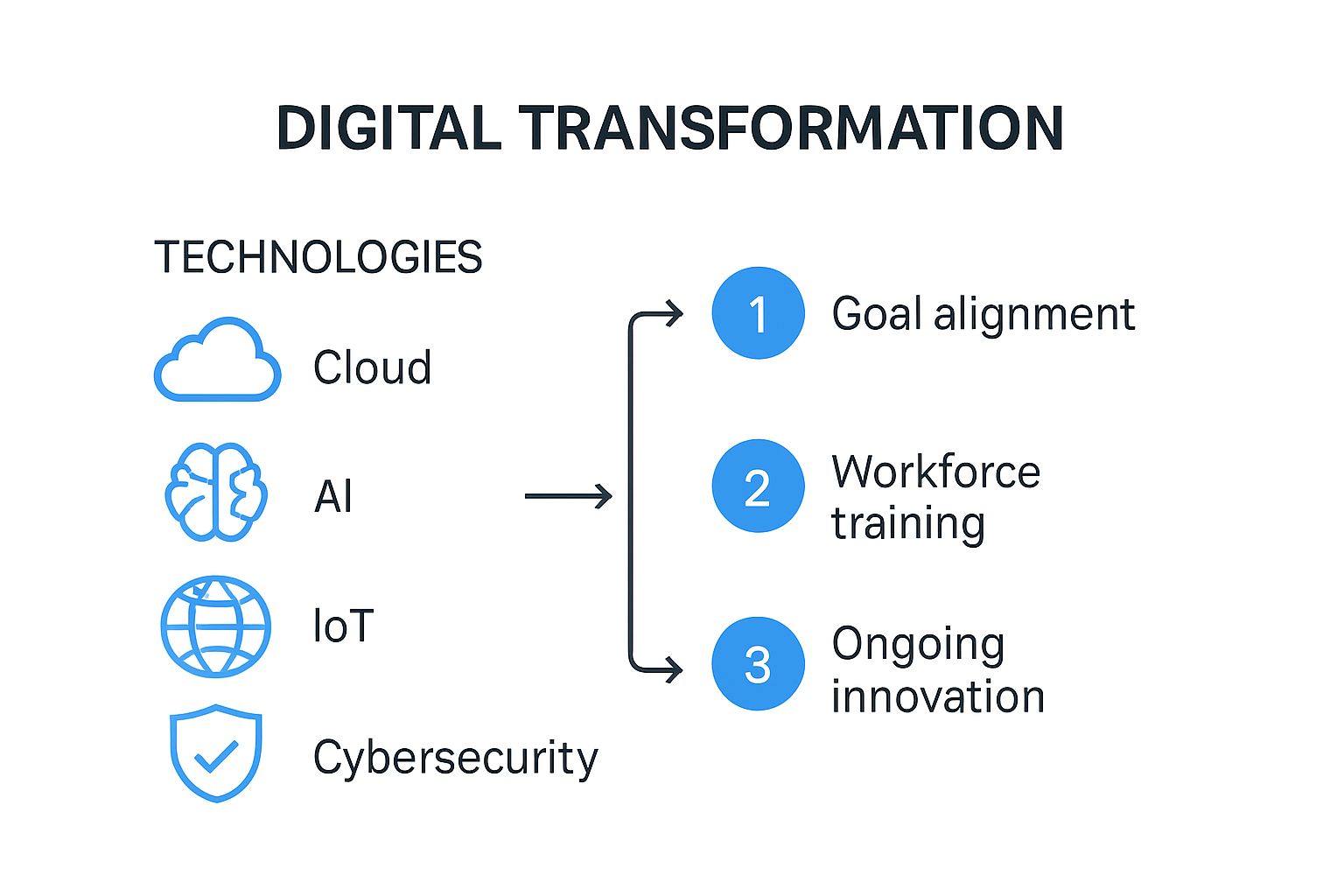Businesses are talking non-stop about digital transformation and it sounds like the latest buzzword, right? Now get this. Almost 70 percent of digital transformation projects fail to reach their goals according to McKinsey. So, while everyone is racing to install the newest tech, the real secret is not about the gadgets at all. It is about rethinking how your whole business runs.
Table of Contents
- Defining Digital Transformation: What It Is And Why It Matters
- The Importance Of Digital Transformation In Today’s Business Landscape
- Key Components Of Digital Transformation: Technologies And Strategies
- Real-World Applications: How Businesses Are Transforming Digitally
- Future Trends In Digital Transformation: What To Expect
Quick Summary
| Takeaway | Explanation |
|---|---|
| Digital transformation is a comprehensive strategy | It involves integrating technology across all functions for a fundamental organisational change. |
| Focus on customer experience is essential | Businesses must rethink how they engage customers to enhance satisfaction and loyalty. |
| Agility and responsiveness provide competitive advantage | Companies thrive when they can quickly adapt to market changes and emerging technologies. |
| Strategic investment in technology is necessary | Successful digital transformation requires aligning technological capabilities with business objectives and cultural readiness. |
| Emerging technologies will define future transformation | Future trends include AI advancements, hyper-personalised experiences, and stronger human-technology collaboration. |
Defining Digital Transformation: What It Is and Why It Matters
Digital transformation represents a profound strategic process where organisations fundamentally reimagine how they operate, deliver value, and engage with customers by leveraging advanced digital technologies. It goes far beyond simply implementing new software or upgrading computer systems.
Core Concept and Strategic Significance
At its essence, digital transformation is a comprehensive organizational change management strategy that integrates digital technologies across all business functions. This approach fundamentally reshapes traditional operational models, creating more agile, efficient, and customer-centric organisational frameworks.
Key characteristics of digital transformation include:
- Comprehensive technological integration across entire organisational ecosystems
- Radical rethinking of business processes and customer experience delivery
- Continuous adaptation to emerging technological capabilities
- Cultural shift towards innovation and technological embracement
Business Impact and Technological Evolution
According to research from EDUCAUSE, digital transformation represents a series of coordinated shifts in culture, workforce, and technology that enable new operating models and fundamentally transform an organisation’s strategic direction.
Businesses undertaking digital transformation are not merely upgrading technology but fundamentally reimagining their value proposition. This means creating more responsive, intelligent systems that can quickly adapt to market changes, customer expectations, and emerging technological opportunities.
Learn more about our digital strategy solutions that can help your organisation navigate this critical technological transition.
The Importance of Digital Transformation in Today’s Business Landscape
Digital transformation has become a critical strategic imperative for businesses seeking to remain competitive, innovative, and responsive in an increasingly technology-driven global marketplace. It represents far more than a technological upgrade - it is a fundamental reimagining of how organisations create value, engage customers, and drive sustainable growth.
Strategic Competitive Advantage
In the current business environment, digital transformation provides organisations with a significant competitive edge. Companies that successfully integrate digital technologies can respond more rapidly to market changes, develop more personalised customer experiences, and optimise their operational efficiency.
Key strategic advantages include:
- Enhanced operational agility and responsiveness
- Improved data-driven decision making capabilities
- More efficient resource allocation
- Increased capacity for innovation and experimentation
- Better customer engagement and personalisation
Economic and Operational Impact
According to research from Albany University, digital transformation is increasingly recognized as central to organisations’ efforts to meet evolving societal and market expectations. It enables businesses to create new value propositions, streamline complex processes, and develop more intelligent, adaptive organisational structures.
Businesses that proactively embrace digital transformation can dramatically reduce operational costs, increase productivity, and create more flexible working environments. This approach allows organisations to leverage emerging technologies like artificial intelligence, cloud computing, and advanced analytics to drive strategic innovation.

Explore our digital transformation strategies to understand how your organisation can effectively navigate this critical technological transition.
Key Components of Digital Transformation: Technologies and Strategies
Digital transformation is a multifaceted process involving sophisticated technological infrastructure, strategic planning, and organisational cultural shifts. Understanding its core components is crucial for businesses seeking meaningful technological evolution and competitive advantage.

Technological Foundations
The technological backbone of digital transformation encompasses several critical elements that enable comprehensive organisational change. These technologies serve as powerful instruments for reimagining business processes, customer interactions, and operational models.
To help readers quickly understand the critical technologies underpinning digital transformation, the following table summarises the key technological components mentioned in the article and the main roles they play in supporting organisational change.
| Technology Component | Purpose in Digital Transformation |
|---|---|
| Cloud computing platforms | Enable scalable, flexible IT infrastructure |
| Advanced data analytics | Drive data-based insights and decisions |
| Artificial intelligence | Automate, predict, and enhance performance |
| Internet of Things (IoT) | Connect devices for real-time monitoring |
| Cybersecurity frameworks | Protect systems and data from threats |
Key technological components include:
- Cloud computing platforms
- Advanced data analytics systems
- Artificial intelligence and machine learning capabilities
- Internet of Things (IoT) integration
- Cybersecurity and risk management frameworks
Strategic Implementation Approach
Successful digital transformation requires more than technological investment. It demands a holistic strategy that aligns technological capabilities with broader organisational objectives, cultural readiness, and human potential.
According to Gartner Research, organisations must develop comprehensive strategies that address technological adoption, workforce reskilling, and continuous innovation. This approach ensures that digital transformation becomes an integrated, sustainable process rather than a one-time technological upgrade.
Discover our comprehensive digital strategy solutions that can help transform your technological infrastructure and business capabilities.
Real-World Applications: How Businesses are Transforming Digitally
Digital transformation is not a theoretical concept but a practical reality across diverse industries. Businesses worldwide are leveraging technological innovations to reimagine their operational models, customer experiences, and competitive strategies.
Industry-Specific Digital Evolution
Different sectors are adopting digital transformation strategies uniquely tailored to their specific challenges and opportunities. This nuanced approach demonstrates that digital transformation is not a one-size-fits-all solution but a sophisticated, contextualised approach to technological integration.
Key industry transformation examples include:
- Healthcare: Implementing telemedicine and digital patient management systems
- Retail: Creating omnichannel shopping experiences and personalised recommendation engines
- Manufacturing: Utilising IoT sensors for predictive maintenance and real-time monitoring
- Financial Services: Developing mobile banking platforms and AI-driven risk assessment tools
- Education: Transitioning to digital learning management systems and remote education technologies
The article provides examples of how various industries are applying digital transformation. The table below helps readers compare sector-specific digital strategies and their intended outcomes at a glance.
| Industry | Digital Transformation Example | Outcome/Benefit |
|---|---|---|
| Healthcare | Telemedicine and digital patient management systems | Improved access and patient engagement |
| Retail | Omnichannel experiences, personalised recommendations | Enhanced customer experience |
| Manufacturing | IoT sensors for predictive maintenance | Increased operational efficiency |
| Financial Services | Mobile banking, AI-driven risk tools | Faster service, reduced risk |
| Education | Digital learning management, remote tech | Flexible, accessible learning |
Strategic Implementation and Outcomes
According to research from McKinsey, companies successfully implementing digital transformation strategies experience significant performance improvements. These organisations demonstrate enhanced operational efficiency, more responsive customer engagement, and greater capacity for innovation.
Successful digital transformation requires more than technological investment - it demands a holistic approach that integrates advanced technologies with human expertise, organisational culture, and strategic vision.
Learn about our tailored digital transformation approaches that can help your organisation navigate this complex technological landscape.
Future Trends in Digital Transformation: What to Expect
The landscape of digital transformation continues to evolve rapidly, with emerging technologies and strategic approaches reshaping how businesses conceptualise technological integration and organisational innovation. Understanding these future trends is crucial for organisations seeking to maintain competitive advantage and technological relevance.
Emerging Technological Paradigms
The next generation of digital transformation will be characterised by increasingly sophisticated, interconnected, and intelligent technological ecosystems. These advanced systems will move beyond traditional digital integration towards more adaptive, predictive, and autonomous technological frameworks.
Key emerging technological trends include:
- Artificial intelligence with advanced contextual understanding
- Quantum computing capabilities
- Hyper-personalised customer experience technologies
- Decentralised blockchain infrastructure
- Advanced cybersecurity with predictive threat detection
Strategic Evolution and Human-Technology Collaboration
According to Deloitte’s Future of Work research, digital transformation is transitioning from a technology-centric approach to a more holistic model that emphasises human-technology collaboration. This emerging paradigm recognises that technological advancement must be balanced with human creativity, emotional intelligence, and strategic thinking.
Future digital transformation strategies will prioritise seamless integration between technological capabilities and human potential, creating more adaptive, responsive, and innovative organisational models.
Explore our forward-thinking digital transformation roadmaps designed to prepare your organisation for the technological challenges of the future.
Ready for Real Digital Transformation in Your Business?
Struggling to keep pace with constant technological change and rising customer demands? If the idea of integrating new tech feels overwhelming or you worry your business might fall behind, you are not alone. The article highlights that real digital transformation means more than a quick upgrade. You need a strategy that connects cutting-edge technologies with flexible, industry-specific solutions.
Let Cloudfusion guide you through a trusted and proven approach. Our team specialises in custom web development, software applications, and secure cloud solutions built for South African businesses. We blend technical skill with innovation to help you rethink operations, streamline workflows, and create richer online experiences. Take the first step today by requesting a web design and development quotation tailored to your business goals. Or visit our digital solutions page to see how our expertise makes digital transformation achievable. Act now to secure your competitive edge and future-proof your company.
Frequently Asked Questions
What is digital transformation?
Digital transformation is a strategic process where organisations fundamentally reimagine their operations by integrating advanced digital technologies across all functions to enhance customer engagement and create value.
Why is digital transformation important for businesses?
Digital transformation is crucial for businesses to remain competitive and innovative. It allows companies to respond quickly to market changes, improve operational efficiency, and create personalised customer experiences, ultimately driving sustainable growth.
What are the key components of digital transformation?
The key components of digital transformation include cloud computing, advanced data analytics, artificial intelligence, Internet of Things (IoT) integration, and effective cybersecurity frameworks, all of which support comprehensive organisational change.
How can organisations effectively implement digital transformation strategies?
To effectively implement digital transformation strategies, organisations should develop comprehensive plans that align technological capabilities with their organisational objectives, embrace cultural shifts, and continuously innovate to sustain the integration of new technologies.








